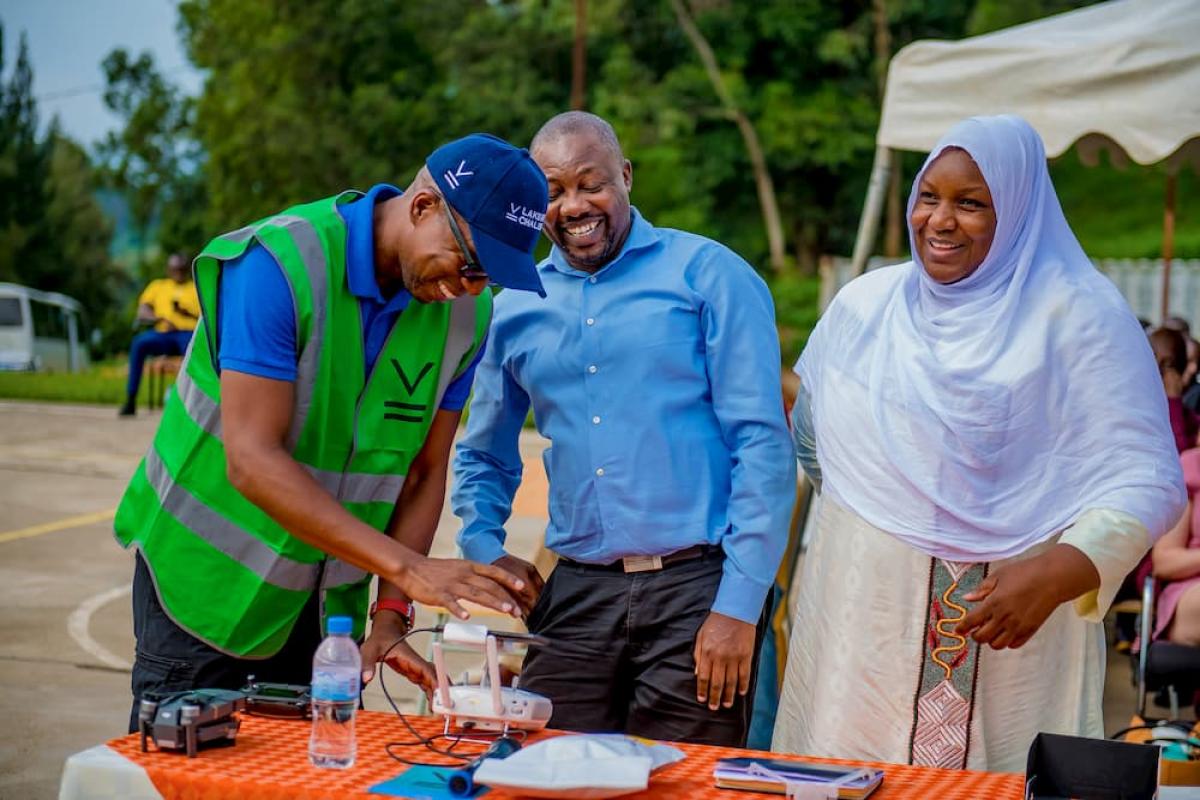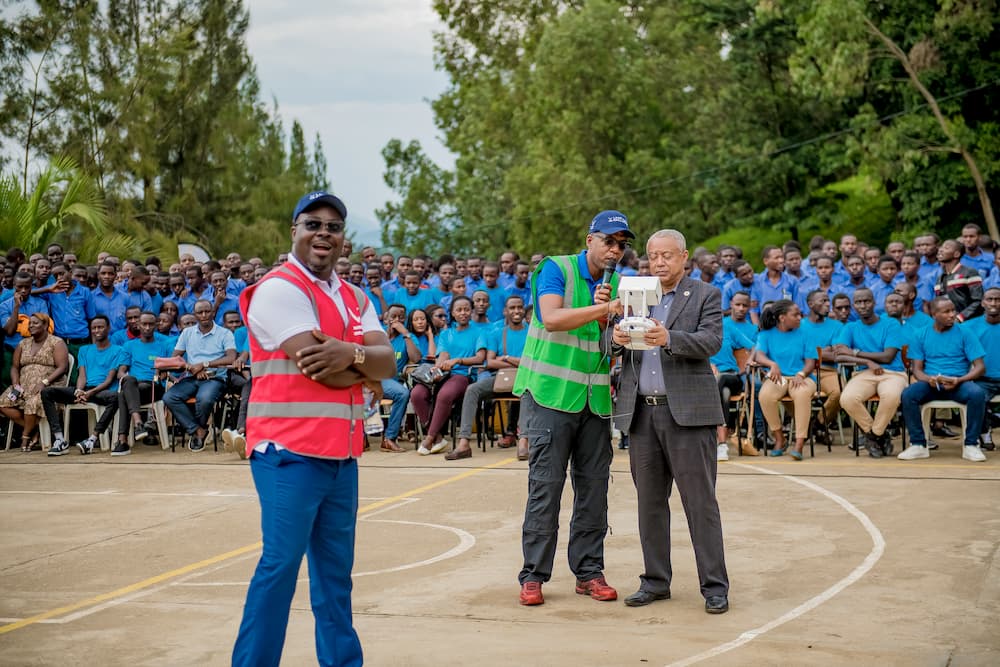
Following the 2020 African Drone Forum, Flying Labs Share Their FAQs
March 4th, 2020

By Tiam (Sénégal Flying Labs), Leka and Yussuf (Tanzania Flying Labs), Cleopa and Mohamed (Kenya Flying Labs)
Entrepreneurs, engineers, manufacturers, and a wide range of drone experts recently convened in Kigali for the 2020 African Drone Forum (ADF). Joined by senior government officials, civil aviation authorities, and a slew of international organizations, ADF included keynotes, panels, training sessions, and live demos. As Flying Labs from Kenya, Sénégal, and Tanzania, we were proud and honored to represent all of Africa's 10+ Flying Labs and, indeed, all 25+ Flying Labs around the world.
Cleopa and Mohamed from Kenya Flying Labs: The highlight of our participation at ADF was Kenya Flying Labs being one of the 10 African Drone Business Challenge finalists from nearly 150 applicants. This was an opportunity to interact with nine other excellent drone business ideas from which we could learn. We were also fortunate to interact with various drone companies represented at the event showcasing exciting drone platforms as well as multiple drone applications and future possibilities, ranging from cargo delivery, precision agriculture, infrastructure inspection, humanitarian use, among others.
We look forward to more of these kinds of forums in Africa to promote and open up conversations around teething issues like regulations, security, and safety.
Leka and Yussuf (Tanzania Flying Labs) and Tiam (Senegal Flying Labs): We were part of the organizing committee for the African Drone Forum. Together, we offered multiple education sessions on drones during ADF and adjoining Lake Kivu Challenge to attendees and local school students, respectively. Also, Leka moderated a panel on the use of drones in humanitarian action. We also held a Flying Labs booth throughout ADF and were very humbled to receive so much interest in our Flying Labs. We answered countless questions on our Flying Labs model from numerous experts, manufacturers, regulators, non-governmental organizations, and students.

As we met so many participants (literally hundreds) at ADF who wanted to learn more about Flying Labs, we didn't get the chance to speak more with everyone interested in learning more about our work. We think that others who were not at ADF will have similar questions, so we've written this post on Frequently Asked Questions (FAQ) to provide more clarity and more informed discussions on our collective work in Africa, Asia, and Latin America.
Q: Who leads individual Flying Labs?
We do. We decide which projects we want to implement, how, where, when, and with whom. We own and manage the Flying Labs of our country, together with our local partners. We are our bosses and make our own decisions. And we all come together through a decentralized network with a distributed governance model, the Flying Labs network that is supported by WeRobotics. Sometimes people get confused between WeRobotics and Flying Labs or misunderstand the relationship. Some people think we are just a branch of WeRobotics, but this is not the case. We are not 'WeRobotics Labs,' we are Flying Labs. We're the ones with the local expertise and the local knowledge. We understand our countries and local contexts better than foreigners, so Flying Labs are not managed remotely. For Flying Labs to be successful, they must be run by local experts.
Q: What is the role of WeRobotics in the Flying Labs network?
WeRobotics is co-creating the Flying Labs network together with us. They also facilitate the network so that we can all easily engage with one another. For us, this is one of the most significant values of being in this network: being able to exchange our experiences with 25+ other countries and learn from each other. For example, Sénégal and Tanzania Flying Labs have trained labs in Kenya, Uganda, Côte d'Ivoire, Sierra Leone, Burkina Faso, Benin, and Cameroon.
WeRobotics enables us to gain visibility and credibility. They help us secure funding and identify new project opportunities. They help us access technology and offer a range of training that helps us best use these technologies. WeRobotics also connects us to new partners and facilitates information sharing across the Flying Labs network, giving us access to the latest lessons learned and best practices across 25+ countries. In return, they ask that we measure our impact, follow a Code of Conduct, and respect the Flying Labs guidelines.
Q: How did we join the Flying Labs network?
Most of us learned about the Flying Labs network through our contacts or from other Flying Labs. We then applied to join the network through the Affiliate Flying Labs Program,* which includes a written application and three-to-four separate interviews conducted by both Flying Labs and WeRobotics. This is also true of the written application, which is jointly evaluated along with the references.
Q: What is the Role of Flying Labs in a Country?
Flying Labs are locally-led knowledge hubs for robotics and data. The goal of individual Flying Labs is to expand the skills, experience, expertise, and opportunities within their own countries. As such, Flying Labs act as a platform that others can use to enrich and engage their communities, mobilize awareness across sectors, and motivate a new generation of people to participate in the social good space.
When a country experiences a disaster, Flying Labs serve as an essential platform to better coordinate local first responders before foreign expertise arrives.
When a country experiences a disaster, Flying Labs serve as an essential platform to better coordinate local first responders before foreign expertise arrives. In fact, to us, our Flying Labs, administered by local leaders who believe in sharing knowledge and expertise, is a platform of the people, for their countries. We care deeply about these values, which are necessary to achieve the Sustainable Development Goals (SDGs).
Q: Sometimes, it seems that Flying Labs want to lead all drone-related activities. What's the role of the Flying Labs?
No, that is not our spirit nor the purpose of our Flying Labs. Our role is to serve as an enabler for others. Every individual and/or organization, regardless of whether they are not-for-profits or commercial, is responsible for practicing the values we hold dear, such as inclusion and equal opportunity. Flying Labs on their own will never have enough capacity to respond to every need in every country or region. What's more, Flying Labs were not created to try and respond to every need in a country or region. We can help create more impact by enabling others to take on these new opportunities. We want to open the doors to those who genuinely believe in cooperation and meaningful contributions to the SDGs. When new requests come to us, we evaluate them and very rarely (if ever) go at it alone. We always reach out to partners and other experts to join us in responding to new requests.
Q: Why is it that some people misunderstand what Flying Labs are about?
The way WeRobotics is co-creating the Flying Labs Network is a new approach. And with all new things, some may feel overwhelmed and need more information to fully understand how the method works and what opportunities and advantages it brings over traditional approaches. We think that today's misinterpretation is about precisely this: not having all the information and comparing it to more conventional models instead of taking a fresh look at something new. We need to do a much better job in explaining what we Flying Labs are all about. We need better explain why we're part of the Flying Labs network and what our values are. This Q&A is one step in that direction.
Q: How can I (We) join the Flying Labs?
If Flying Labs already exist in your country, then please reach out to them to join and partner. If one doesn't exist, then please see the Affiliate Program to apply to coordinate your own Flying Labs. We also recommend reaching out to Flying Labs in your region to learn more about the work they do.
Q: Tell us about the Drone Pilot certification on the continent.
As part of the leading drone groups in Africa, we always strive for the highest operations standards.
Increasingly more African countries require certification standards to operate drones commercially with welcomed but stringent requirements by most of our local CAAs. We decided to go above and beyond and looked at one of the highest international certifications: The UK Civil Aviation Certificate of Competency. To that end, we are partnering with a UK CAA approved full National Qualified Entity (NQE) based in the UK. Through this partnership, Flying Labs can administer the competency course while the NQE issues the official UK certificate of competency. In the absence of local certification, some African countries recognize this certificate of competency as a national equivalent.
Today you can register and join either Senegal or Tanzania Flying Labs to be certified if you meet the requirements. Sign up here.
Recent Articles

